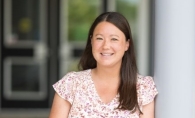
Since it was opened in 2015, Level Up Academy has stayed true to its mission of empowering students and teachers to create a classroom environment that fosters curiosity, innovation and problem solving. Started by a group of education professionals and community members dedicated to the idea that self-paced, “blended” learning is the key to student success, the public charter school offers a unique program that combines technology, individualized learning plans and small, mixed-grade classes to help students flourish.
As a public school, Level Up’s curriculum adheres to state standards, but how that material is taught is what sets the school apart. Each incoming student has a customized learner profile, with information provided by past teachers, parents and the students themselves.
“We want to know who you are as a learner, what learning environment works best for you,” says partnership director Molly Dandelet. “The profile grows with them, so from year to year you have a history to track how you change and what doesn’t change.”
Digital portfolios also serve to track student achievement and learning preferences to help teachers tailor instruction for each child. “It documents ‘aha’ moments or learning turning points, things that made them stretch themselves as a learner,” says Dandelet.
This information helps students become advocates for their own education, allowing them to choose, for example, to approach a project by working in a group or on their own. That flexibility and choice are at the core of the school’s blended learning concept, which breaks up instruction into different forms of engagement with material.
In a typical class period, a student might spend 20 minutes in a small group with a teacher, another 20 minutes working on a project and the remainder of class on a laptop playing a relevant game. “No matter where a child goes in that rotation, they’re always learning at their level; everyone’s content is individualized,” Dandelet says. “Engagement is key: When kids play games, they forget that they’re learning.”
Computer games and coding are part of the curriculum beginning in kindergarten, allowing students to master traditional subjects like math and language arts while gaining computational skills and having fun.
“So often at parent-teacher conferences I hear parents say ‘My kid never liked school, but now they love it,’ ” says Amber Espinosa, a parent of two Level Up students and a teacher at the school. She has witnessed many times the positive effect that individualized instruction and smaller class sizes can have on a student’s life. “I watched my kids survive school, but never really enjoy it,” she says. “Now, they feel like this is a community where they belong.”
That sense of belonging is fostered by policies like weekly LINK, an initiative that encourages every adult at the school to develop relationships with students outside of the classroom, and weCODE, the school’s code of conduct that emphasizes cooperation, ownership and peer support.
“If you have problems, someone always comes to help you work through it,” says eighth-grader Taryn Collins, who used to struggle with math but, with hands-on help from Ms. Espinosa, is quickly catching up. “You get to work at your own pace and do all the things you need to do, then branch out to do things you want to do.”
Level Up is a good fit for Taryn socially, too. “It’s a lot easier to make lasting friends when you’re not overwhelmed by a sea of people,” she says.
This fall, Level Up will begin using the Summit Learning Platform, an online tool that helps students set and reach goals at their own pace and allows teachers to use data to further personalize instruction.









